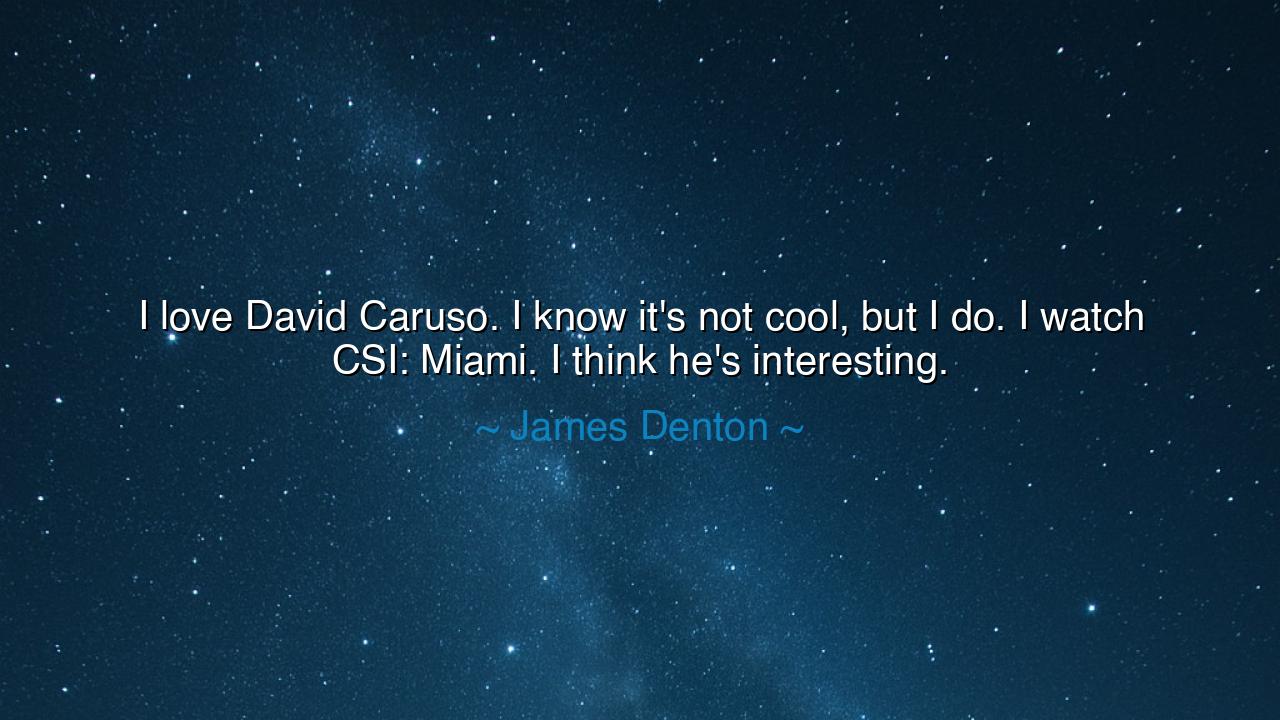
I love David Caruso. I know it's not cool, but I do. I watch CSI:
I love David Caruso. I know it's not cool, but I do. I watch CSI: Miami. I think he's interesting.






In the words of James Denton, we encounter a reflection on personal preference and the courage to stand by one’s own unique taste, even in the face of societal judgment. Denton’s declaration that he loves David Caruso and watches CSI: Miami, despite knowing it might not be considered "cool," speaks to the enduring human truth that authenticity is far more valuable than conformity. It is easy to follow what is popular, what is accepted by the crowd, but true wisdom lies in recognizing what brings individual joy—even if it does not align with the prevailing cultural trends. Denton’s simple admission is a testament to the importance of embracing one’s own preferences, regardless of the world’s perceptions, and finding meaning in the things that speak to the soul.
This notion of individuality is not new. The ancients, particularly the philosophers of Greece, taught that true happiness is found not in following the crowd, but in the pursuit of one's own truth. Socrates, for instance, rejected the opinions of the masses and devoted his life to questioning what others took for granted. He believed that the unexamined life was not worth living, meaning that one must find meaning and direction from within, rather than bowing to external pressures. Similarly, Denton’s fondness for Caruso—an actor some might dismiss—illustrates this very principle. It is in choosing what resonates with us on a personal level, rather than conforming to what is deemed acceptable or fashionable, that we discover our own path.
Consider also the example of the Roman Emperor Marcus Aurelius, who, despite his power and influence, consistently emphasized the importance of self-reflection and authenticity. Marcus often wrote in his Meditations about the need to rise above the judgment of others, to cultivate one’s own sense of virtue, and to remain true to one’s principles despite external opinions. His life was not one lived for the adoration of the masses but for the internal satisfaction of knowing that his actions were aligned with his own beliefs. In much the same way, Denton’s admission of loving Caruso, regardless of how others might perceive it, echoes the idea that the key to fulfillment lies in living in accordance with one’s own values, not the ever-changing trends of society.
The importance of authenticity over popular opinion is further demonstrated by Michelangelo, whose work was often met with both adoration and disdain during his lifetime. Despite facing criticism from those around him, Michelangelo remained committed to his vision, creating masterpieces that would become eternal symbols of human expression and genius. His David, for instance, was controversial at the time for its unconventional portrayal of the human form, yet it remains one of the most celebrated sculptures in history. In this way, Michelangelo teaches us that true greatness often comes from following one’s own instincts, even when it stands in opposition to the popular consensus.
The lesson here is clear: individuality should be celebrated, not stifled. Denton’s recognition of David Caruso’s appeal, despite it not being "cool," serves as a reminder that there is no universal standard for what is valuable or worthy of affection. We each find meaning and inspiration in different things, and the courage to embrace those choices, rather than surrender to the pressures of social expectation, is a source of true strength. In a world that often urges conformity, those who dare to be authentic find a deeper connection to themselves and to the world around them.
In our own lives, we must not be afraid to acknowledge the things that bring us joy, even if they are not part of the mainstream. Whether it is a favorite show, a specific art form, or a personal belief, it is these individual preferences that shape who we are. Just as Denton embraces his affection for Caruso, we too must find the courage to stand by what we love, regardless of its popularity or the opinions of others. In doing so, we align ourselves with our true selves and cultivate a deeper sense of peace and self-respect.
So, let us be like Socrates, Michelangelo, and Denton—embracing the things that resonate with our inner truth, regardless of what others think. Let us celebrate individuality and authenticity, for it is in these expressions of self that we find the most profound connections with both ourselves and the world. True wisdom lies not in following the crowd, but in forging our own path, trusting that what speaks to us personally will, in the end, carry its own meaning and significance.






AAdministratorAdministrator
Welcome, honored guests. Please leave a comment, we will respond soon